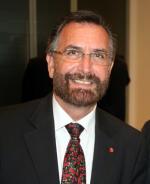
David Rosen
Rabbi, Special Advisor to the Abrahamic Family House (AFH) in Abu Dhabi, Israelbiography
The concept of what we call today “sustainable development”, is to be found at the beginning of the Bible in the book of Genesis (2:15) where Adam is placed in “the garden” for the purpose described by the Hebrew words as “l’ovdahulshomrah”.
The Hebrew word “avodah” means “work” but it also means “service”.
Work of value is that which serves and contributes to human welfare.
But the second word coming from the root “shamar” means to preserve.
How does one preserve that which one is working, transforming, developing? The answer is, by doing so responsibly; by protecting the resources that one develops; by guaranteeing their healthy renewal for ourselves and for future generations. And this is precisely what is meant today by “sustainable development.”
Indeed, Jewish tradition extends the understanding of the Biblical prohibition in Deuteronomy 20:19, to be a prohibition against all forms of degradation of sustenance, goods, and resources.
But what is it that enables us to behave in such a responsible and sustainable manner ?
At the heart of the Biblical view of natural resources, is the recognition that we are NOT the owners of them.
If we are truly conscious of the idea that the cosmos is the creation of the Source of All, we cannot presume to own it.
The Heavens declare the glory of God, and the firmament proclaims the work of his hands (Psalm 19:2).
For the earth is mine (says God) for you are strangers and sojourners with me (Leviticus 25:23)
A truly religious world view can only see human ownership as tenancy. To see it as anything more than that, is both impious and ultimately immoral.
The consciousness that we are not real owners of anything (and even our own bodies are given to us in trust to develop and use responsibly) seeks to deliver us from the shackles of human arrogance.
For it is arrogance that justifies greed, unrestricted license and exploitation, and even violence towards others, causing and/or compounding the impoverishment of others.
Poverty therefore challenges us not only to work to make resources more available and accessible; but also to combat human arrogance and avarice by demonstrating the alternative.
Indeed, wise and responsible reorientation and utilization of resources could enable us to address most of the shameful hunger and poverty that afflict our planet.
The Biblical affirmation of the Divine Presence and ownership of the cosmos, thus rejects “a culture of entitlement”. The Biblical affirmation of the Divine-given dignity of every human person and our particular responsibilities for the poor and vulnerable; demand of us to work for a more equitable planet in which none have to suffer poverty, but all can enjoy sustenance in a sustainable manner both today and for future generations